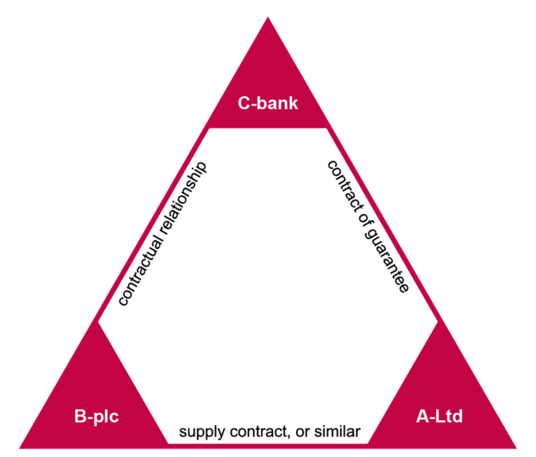07.10.2024
In international trade, bank guarantees are indispensable. They play a crucial role, helping to minimise the risk of non-payment or non-performance and strengthen trust between the parties. Bank guarantees safeguard, for example, a seller’s claim for payment or a buyer’s claim for performance.
In this blog series (parts 1-3), we take a look at the enforcement of bank guarantees. The first part of the blog series examines the guarantee debtor’s options for legal protection. The second and third parts will focus on the options available to the guarantee creditor (part 2) and the guarantee bank (part 3).
In practice, what is known as a bank guarantee payable “on first demand” is often agreed upon. Here, the guarantee bank generally pays the guaranteed sum to the guarantee creditor within a few days after the guarantee has been called upon, rather than examining any (material) objections arising from the contractual relationship between the guarantee debtor and the guarantee creditor. Then, the principle of “pay first, litigate later” applies: the contracting parties usually only bring court or arbitration proceedings over the existence of the secured claim after the guarantee has been called upon.
However, this typical sequence of (i) payment under the guarantee and (ii) recovery process between the contracting parties can be broken. The guarantee debtor may, for example, have a particular interest in preventing payment under the guarantee by the guarantee bank. One reason for this could be that the guarantee creditor is at risk of insolvency. Another possible reason could be a liquidity shortfall of the guarantee debtor, as the guarantee bank will collect the guaranteed sum from the guarantee debtor after payment. Lastly, preventing the guarantee payment can have the advantage for the guarantee debtor not having to initiate costly follow-up proceedings against the guarantee creditor for recovery.
The following example illustrates the specific options for legal protection available to a guarantee debtor:
A-Ltd concludes a supply contract with supplier B-plc for plastic granulate to manufacture plastic packaging. In order to secure A-Ltd’s claim for delivery, the parties agree that B-plc will provide A-Ltd with a bank guarantee in the form of a supply guarantee.
B-plc then instructs its principal bank, C-bank, to issue a guarantee to A-Ltd, under which C-bank undertakes to cover the risk of non-performance or delayed delivery by B-plc to A-Ltd. In case B-plc does not fulfil its delivery obligations or does not fulfil them in accordance with the contract, C-bank is obliged to pay a fixed guaranteed sum to A-Ltd on “first demand”.
When B-plc failed to make a large delivery of plastic granulate in violation of the contractual agreement, A-Ltd demands payment of the guaranteed sum from C-bank.

In our example, guarantee debtor B-plc has the following options:
I. Legal protection against the guarantee bank
Whether an action against C-bank in the form of a preliminary injunction to prevent a payment is likely to succeed can be assessed on the basis of the contractual arrangement in the guarantee agreement between C-bank and B-plc and, in addition, according to the rules of the law applicable in this relationship. The contractual agreements may include detailed provisions concerning a refusal to pay, for example if an enforceable (arbitration) court order exists against A-Ltd, which would prohibit A-Ltd from making a claim under the guarantee.
If the guarantee agreement does not contain any such provisions, the payment of a guarantee payable “on first demand” can usually only be prevented in cases of abuse. This means that the claim under the guarantee must be deemed abused and it must be possible to prove this with “readily available” evidence. This may be the case, for example, if A-Ltd and B-plc have agreed to return the guarantee at a certain point in time but A-Ltd nevertheless proceeds after this point in time under the non-returned guarantee.
If C-bank has already paid the guaranteed sum to A-Ltd, B-plc could lodge an objection to its account balance with C-bank if the payment was unauthorised under the terms of the guarantee agreement or in case of abuse. In addition, C-bank could be liable for damages if it did not notify B-plc immediately of the claim and B-plc was therefore no longer able to prevent the payment.
II. Legal protection against the guarantee creditor
Action by B-plc against A-Ltd may also be a possibility. If the supply contract between B-plc and A-Ltd contains certain conditions for the claim under the guarantee and A-Ltd requests payment under the guarantee regardless of these conditions, A-Ltd will be in violation of the provisions of the supply contract. This may justify a motion for a preliminary injunction against A-Ltd without the claim having to be deemed abusive of the law at the same time.
If the guaranteed sum has already been paid to A-Ltd, B-plc can bring court (or arbitration) action for repayment of the guaranteed sum against A-Ltd if the payment was unauthorised according to the contractual agreements with A-Ltd. In this respect, however, A-Ltd may also have counterclaims against B-plc that must be taken into account.
It should also be noted that the legal assessment of claims between the contracting parties may be subject to a different legal jurisdiction than the relationship between the guarantor (C-bank) and the guarantee creditor (A-Ltd).
III. Conclusion
Which specific course of action is appropriate from a strategic and legal perspective ultimately depends on the circumstances of the individual case at hand. If interim legal protection appears appropriate, acting in time is always of the essence, as the guarantee bank will usually arrange for the guaranteed sum to be paid within a few days.

Dr Stephan Bausch, D.U.
Partner
Cologne
stephan.bausch@luther-lawfirm.com
+49 221 9937 25782

Stephanie Quaß
Senior Associate
Frankfurt a.M.
stephanie.quass@luther-lawfirm.com
+49 69 27229 25782
Moritz Ziegler